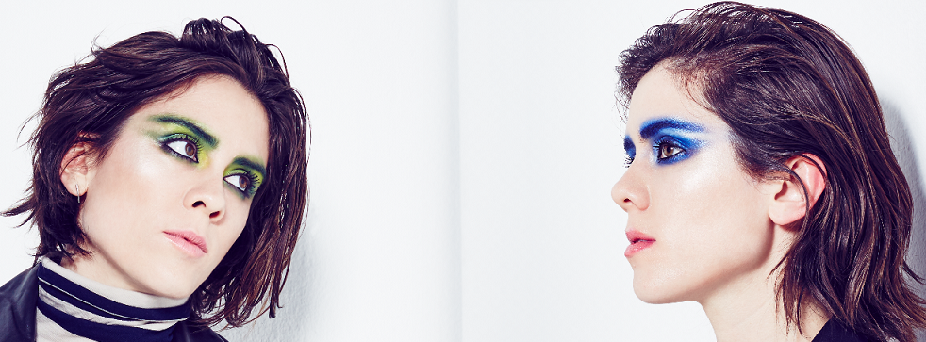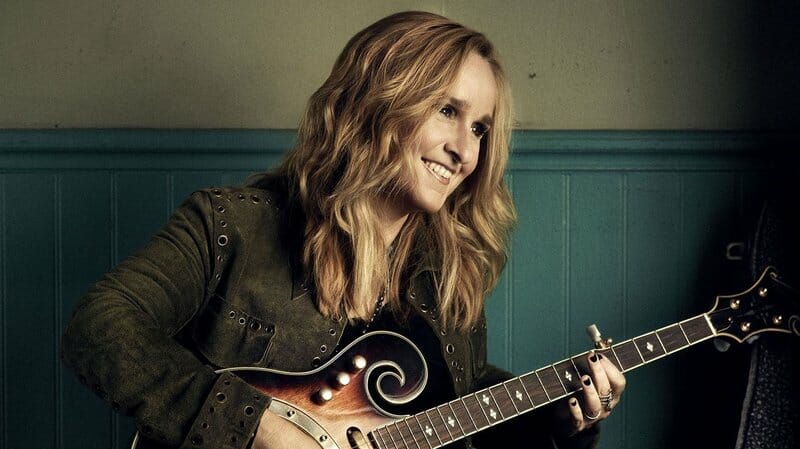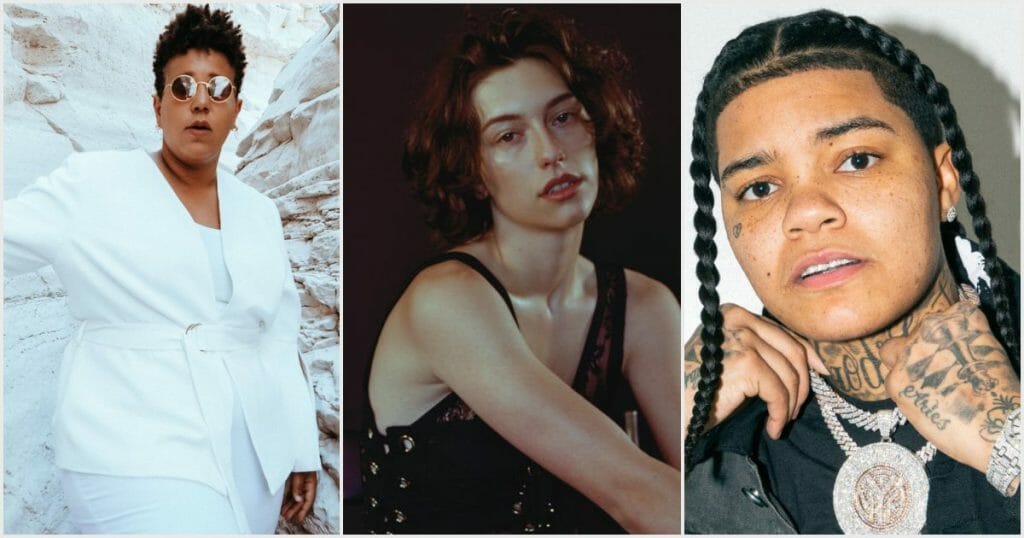This year’s Outstanding Music Artist nominees represent some of the most incredible talent in music today, including five artists who are bringing queer and lesbian visibility and artistry to the forefront of the industry.
Brittany Howard’s debut album, Jamie, is a collection of eleven powerful, ambitious, rock and roll inspired songs. Jamie is named after Howard’s sister, who taught her how to write a song but passed away at the young age of 13. Howard stepped down as the lead singer for Alabama Shakes to create a personal album with lyrics about her sexuality, family tragedies, and social awakenings.
From the beginning, Howard is honest about her experiences as a queer mixed-race girl in Alabama. Howard reveals her social awakening through the soft yet lyrically dark lo-fi tune ‘Goat Head’ where she sings, “My mama was brave/To take me outside/’Cause mama is white/And daddy is black/When I first got made/Guess I made these folks mad.”
The love songs on Jaime promote the strength in choosing love in a world fueled by divisiveness. Howards voice roars in the soulful ballad ‘Georgia’, in which she proclaims her love for an older woman. She unapologetically sings: ‘Georgia, I think if I got you/ you could tell I’m being sincere/and I can’t help the way that I was born to be / I ain’t no little boy.’ The melancholy bluesy track ‘Stay High’ guides the album through the relatable desire to live forever with a lover: ‘Cause once you know, then you know /And you don’t wanna go/Back to wherever it is that you come from, yeah/ I just want to stay high with you.’ ‘Short and Sweet’ is about acknowledging differences between two people and the importance of cherishing time. “There are mountains between us/There is time between us/Oh, ain’t there something between us/Something short and sweet”. Howard had full creative control of the album and it showecases love asthe most important aspect of her life.
21 year old singer-songwriter Mikaela Straus, better known as King Princess, graced pop music last year with her undeniabley queer debut album, Cheap Queen. The album follows the story of personal heartbreak. Beginning with the relatable tracks ‘Tough on Myself’, ‘Useless Phrases’ and ‘Ain’t Together’, Cheap Queen is about the emotionally draining stages of a break up with her ex-girlfriend. Not only does King Princess sing about her attraction to women, but also the connection to discovering her gender identity (King Princess identifies as genderqueer and uses she/her pronouns.) In a recent interview with them, King Princess said “It’s something I kind of came into later, I like that I can ride that line on the periphery of femininity. I don’t always have to be an active participant. I think that’s really freeing.” The Brooklyn native has been out from the beginning of her career, and claims to have always known her truth but chose to come out at the age of 13. In an exclusive interview with The Cut, Straus described her experience with rediscovering the hidden parts of herself: “I always knew what I wanted, I’m a great example of somebody who is gay, but exists on a very complicated gender spectrum.”
King Princess is vulnerable yet resilient and her silky alto voice on Cheap Queen effortlessly generates the importance of being open. On a mission to save the world with her music, King Princess told Rolling Stone: “I want to get to a place where the story is less about me and my face and more about what’s going on in this world. How I can be an active voice for gay people but also the music industry, This is the art we need right now. We’re in a renaissance, and we need people to rebel, come forth and bring messages into art.”
In 2016, Katorah Marrero, better known as Young M.A, became one of the first openly gay woman to make waves in hip-hop. Four years later, she dropped her first solo album, Herstory in the Making – an autobiography that follows her childhood traumas, homophobia, and unexpectedly fast rise to fame. In a recent interview with Out, she spoke about her experiences following the death of her brother in 2009: “All this stuff that was fun and you used to see all the time becomes no longer, because now you know that death is for real but he encouraged me to develop my craft and he taught me how to be strong”.
Early in her career, Young M.A decided to remain an independent artist due to the lack of understanding of the lesbian community in the music industry. The first single on the album, ‘No Mercy’, calls attention to the importance of open conversation about acceptance for the LGBTQ community: ‘Some say it’s a sin / But I’m a dyke and she a femme/ it’s a synonym.’ In an interview with TIME, Young M.A expressed her love and support for the LGBTQ community: “The LGBT community, I love them with my soul…We know who we are, we know what we represent, we know who we love.”

Tegan and Sara relive 90’s teenage angst with their ninth album, Hey, I’m Just Like You. Referencing their high school diaries for lyrics, Hey, I’m Just Like You is an open-hearted love letter to fans about self acceptance. In an interview with The Guardian, Sara shared: “I have a lot of self-hatred and internalized homophobia stemming from difficult high school years, but revisiting the music and memories of the time helped me, I’m so amazed at what that person accomplished, knowing that inside they were really, really damaged.”
Hey, I’m Just Like You features honest confessions about coming out through catchy melodies, like the song ‘Hello, I’m Right Here’, where the lyrics poetically tell the story of the beginning stages of true self-acceptance: ‘And I’m young, but it’s hard to believe/Yeah, yeah/That someday, I will never see you again/And you might not believe this, but you’ve changed me so much’. In an intimate interview with GLAAD’s Head of Talent Anthony Ramos, Sara said: “I think at that point I knew I was gay and was finally sort of ready to sit down and say ‘okay, I need to figure out a future for myself because the future is now.’” Along with the album, Tegan and Sara released a memoir called High School as an ode to their growth as women, sisters, and queer artists. For more Tegan and Sara, check out their exclusive interview with GLAAD here.

Last year, the iconic two-time Grammy award winner Melissa Etheridge released her 15th studio album, The Medicine Show. Etheridge has been in the music industry for over 35 years and continues to inspire her fans with her raw and authentic songs. The Medicine Show is an eclectic variety of eleven songs dedicated to healing the mind, body, and spirit.
Etheridge came out 26 years ago before she released the album Yes, I Am, which became one of the most iconic queer albums to date. In an interview with The New York Post, she said: “It’s seriously important that people from around the world have a place where they are welcome and I want to support all our brothers and sisters — we’re all in this together.”
For three decades, Etheridge has been an outspoken and fearless through her music, and The Medicine Show is no exception. The lyrics on the album shine light on the beauty of breaking through hard times to find one’s true self. Etheridge’s natural talent for writing relatable lyrics proves to be true with songs like ‘Love will Live’, in which she faces her fears head on: “I did not shatter, did not crumble, didn’t die/I have chosen to live/I’m no longer down, I am so much stronger now/I’ve got so much to give.”
For more information about the 31st Annual GLAAD Media Awards, including a full list of nominees and how to get tickets, please visit www.glaad.org/mediaawards.













